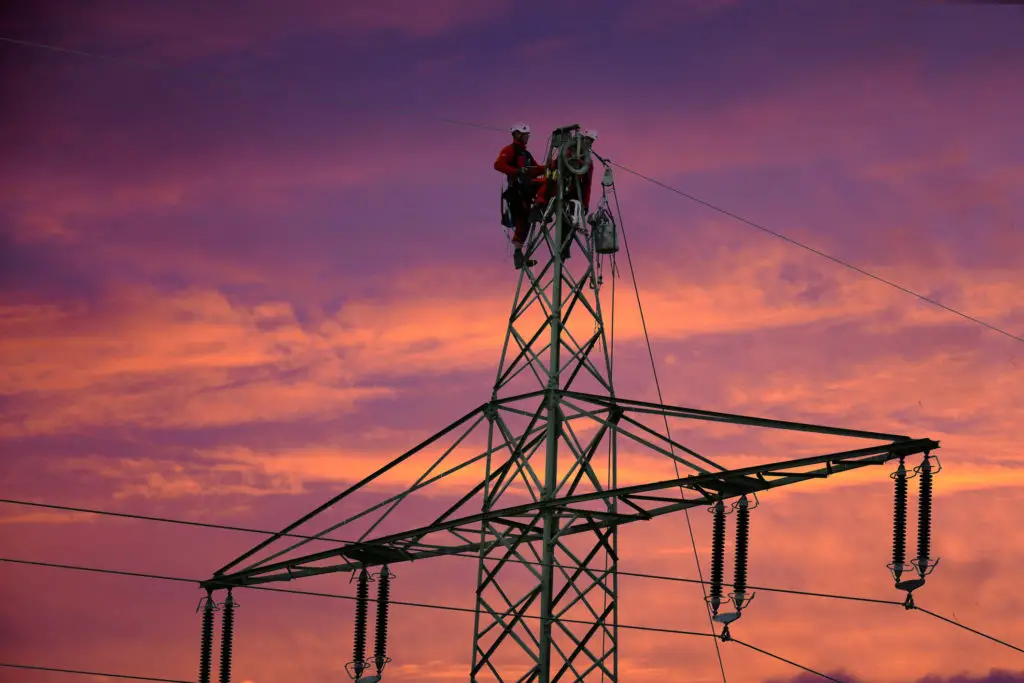One of the great appeals to me in making the jump from electrician to utility worker or power lineman is the vision that I’ll be outside working in the fresh clean air basking in the sun. However, a few conversations I have had with my high voltage electrician colleagues has kind of burst that bubble.
Do power linemen work at night? is the original question I started with, but the same question applies to pretty much all high voltage utility workers. I wrote an article (linked here) about how I have to work nights as an electrcian, so let’s take a little look to find out if the same is true for our high voltage colleagues.

Do Power Lineman Work at Night?
The majority of power linemen and other utility workers will have to work at night. Turning power off is very disruptive so the decision is often made to carry out the work at night to minimise disruption to the customer. Alongside planned night work there is also the call-out rota to consider.
There are three kinds of night working for utility workers.
The Scheduled Night Shifts
These are used when it has been deemed too disruptive to interrupt the power supply during normal working hours. As an example, I worked a night shift recently to swap over the supplies for a new transformer in a shopping mall. The shopping mall owner would much rather pay the greater cost to have us in working at night, than lose business by closing during the day.
The On-Call Night Shift
Many power linemen, electricians and utility workers take part in a call-out rota. In addition to their normal shift, they are on standby at home waiting for a call in case of an emergency. If the power goes down in the middle of the night (perhaps due to a storm) it’s important for the utility company to have a team of guys and girls they can call on to respond at all hours and get the power reinstated.
The Overrunning Night Shift
Whenever we carry out big jobs, such as changing to a new distribution board or transformer, there is always a point of no return. Once the old cable has been removed, the only way that the power is going back on is by completing the planned work. Calling it a day because 5 pm has come is not an option. In these scenarios it can be a long day indeed, starting at 7 am or earlier and running late into the night.
Can You be a Power Lineman that Only Works Day Shifts?
I guess technically it would be possible to be a power lineman or utility electrician who only worked day shifts and refused to do nights, but it’s not very realistic. Those who work for companies will have in their contracts the requirement to be flexible with their working hours. It’s also usually stated that taking part in a call-out rota is part and parcel of the job.
Self-employed workers who sub-contrcat to others have more freedom over their decisions. they can technically pick and choose when and where they work, and decline all night work if they want. Again, the realities of life may clash with this approach. Employers will quickly get frustrated by the worker’s refusal to be flexible and are less likely to hire them for their team next time.
Different companies will have different requirements and expectations regarding night shift working. While for the majority of people some night working is unavoidable, different companies will require different amounts. Some may stipulate you must be part of a 1 in 3-week standby rota (ie on-call one week out of every three) others may have a 1 in 12-week standby rota.
Is it Dangerous for Lineman to Work at Night?
Working at night adds another element of risk to the work that lineman and other utility electricians do, but it is not excessively dangerous or it would not be done. In my experience, the most significant additional risk is the fatigue factor that can lead to poorer decision-making.
The lighting levels at night can make the work more dangerous but generally with all the temporary lighting that can be used this risk is minimalized. Having less vision relies on slowing everything down and taking in our surroundings. It always amazes me how much our eyes can adapt to low light levels.
Whenever I work night shifts I find that there are points in the night when the working pace drops off, usually, around 2 am (the low-ebb point as my colleague calls it) Your body starts getting tired and your thought process slows down. There are systems in place to control this hazard (such as always working in pairs) but it is an additional danger non-the-less
I’ve Never Loved Working Night Shifts
I personally find working nights more difficult as it is much harder to rest properly in between shifts. Trying to catch up on sleep during the day is difficult as the rest of the world is awake. I remember dropping off to sleep at 7 am after a busy night shift to be woken by my neighbour cutting grass at 11 am. But what can you say? 11 am isn’t exactly an unsociable hour to be cutting the grass!
Despite the challenges, I don’t mind working nights in short bursts (perhaps a few months at a time) and the additional money that comes from night shifts is definitely a real bonus when the pay packet comes at the end of the month! This article I found seems to support that working night shifts long-term is not great for our bodies.
Final Thoughts
I hope this article has demonstrated that power linemen do work nights, as well as all other utility workers and electricians. The work we do is inherently disruptive and as long as it is disruptive there will always be a cost calculation taken.
If the additional wage level paid to work night shifts is less than the financial impact of closing during the day, or not getting the power restored for many hours, then completing the job at night is always going to be the option chosen.
I wouldn’t let working nights put you off a career change though. As mentioned I don’t love working nights, but I certainly don’t dread them and there is usually a good atmosphere among the guys and girls working.

